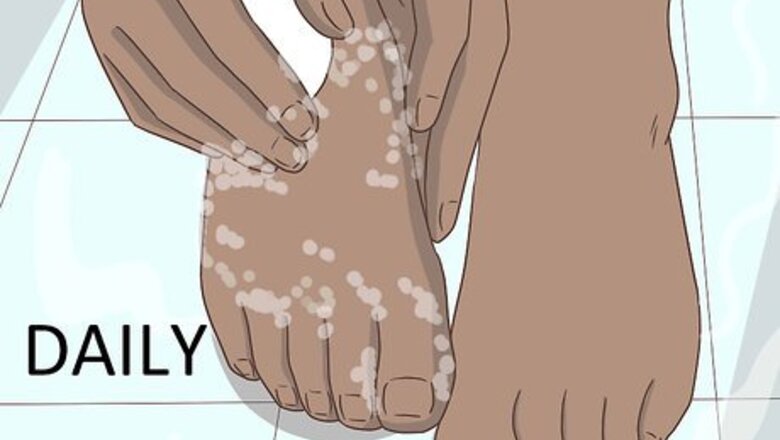
views
Improving Hygiene and Cleanliness
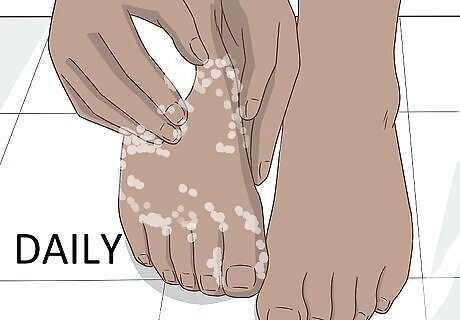
Wash your feet every day. One of the most important things you can do to keep your feet from sweating is to wash them thoroughly every day. This will help to minimize any bacteria or fungi that might be living in the damp environment of your socks. Use antibacterial soap each time you wash your feet. Even if you don’t shower every day, you should wash your feet with soap and warm water on a daily basis. Bacteria and fungi thrive in warm, damp settings, so inside your socks and around your feet are perfect places for them to grow.
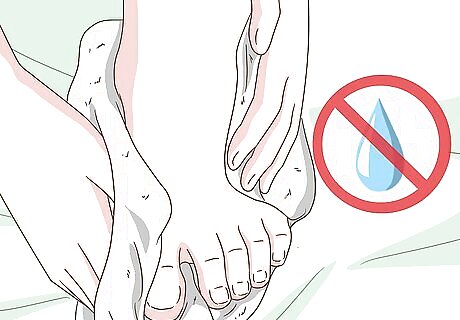
Let your feet dry. Be sure to dry your feet completely before putting shoes or socks on. Any time your feet get wet, they need to be thoroughly dried before being confined to shoes and/or socks again. This will also help minimize the potential for bacteria growth. You may even want to use a hairdryer on your feet to make sure they are super dry.
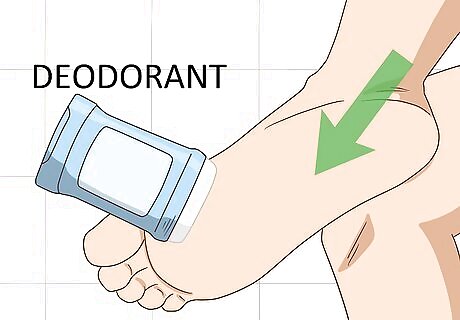
Apply deodorant on your feet. Antiperspirant deodorant can be applied to other parts of the body too, not just to underarms. If your feet are sweating a lot, try spraying some deodorant on the soles of your feet before you put your socks on. Make sure you use the antiperspirant type of deodorant for the best results. Look for the active ingredients aluminum zirconium (trichlorohydrex) or aluminum chloride (hexahydrate). You can start by applying the same kind of deodorant you use on your underarms to your feet. But if this seems to have minimal effect, you may need to ask your doctor about prescription strength deodorant. Purchase a spray antiperspirant deodorant for your feet.
Caring for Your Footwear
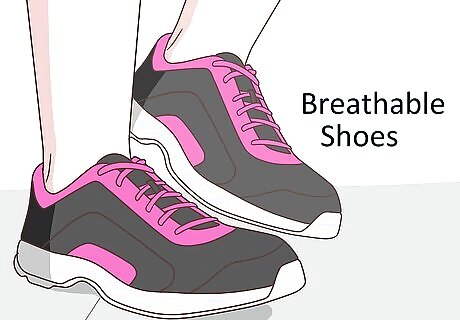
Choose breathable shoes. When feet are confined inside thick shoes, they often sweat. If you’re having trouble with this, try choosing more breathable shoes to minimize the problem. Try tennis shoes made of breathable canvas material, or sandals during warmer weather. Avoid rubber shoes that don’t allow any air flow. Try rotating your shoes every day. This will allow your shoes to dry completely between uses.
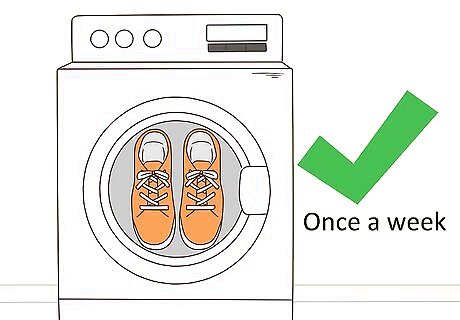
Wash your shoes regularly. Cleaning your shoes can help eliminate any buildup of bacteria or other pesky irritants inside your shoes. Wash shoes that you wear regularly at least once every week or so. You can try washing your shoes with soap and water in the sink, or running them through the dishwasher/washing machine by themselves. Be sure to let your shoes dry completely before wearing them again.
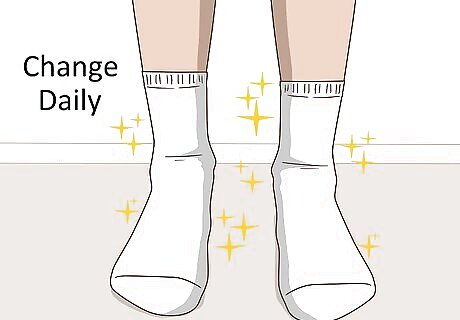
Change your socks every day. If your feet sweat a lot, your socks will inevitably soak up all of that excess sweat and grime caused by your feet. To prevent problematic odor and bacteria growth, you should avoid wearing the same socks for more than one day. Wash your socks regularly and consider changing your socks multiple times in a day if they become too damp with sweat.
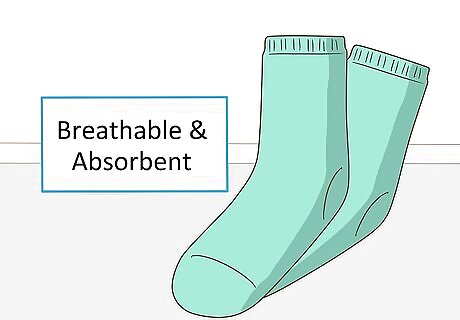
Choose socks that are breathable and absorbent. For sweaty feet issues, synthetic socks are often more effective because they allow more air to flow through and they absorb more of the excess sweat. They also wick moisture away from your feet. Some people have also had success with socks made of natural fibers. The natural materials often have higher levels of absorption, leaving your feet less sweaty and uncomfortable. Consider trying socks made of natural fibers like hemp, bamboo, or wool.
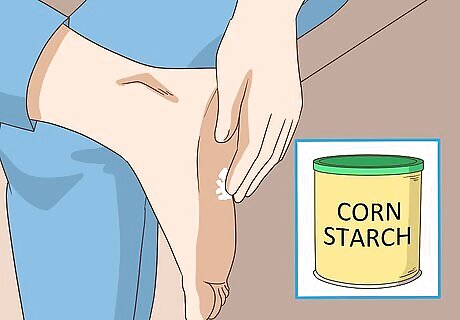
Apply cornstarch. If you don’t have any antifungal powders, you can try applying cornstarch to your feet. Just rub a pinch of cornstarch on the bottom of your feet before you put your socks on. This can help sweaty feet stay dry for longer periods of time. You can also sprinkle some cornstarch in your shoes to add an extra absorbent measure.
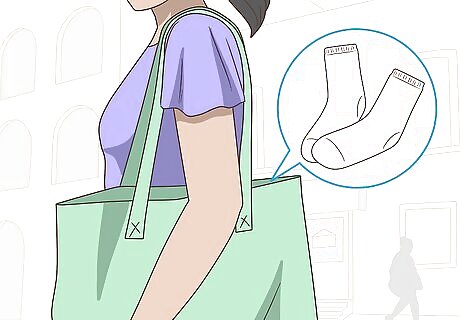
Bring an extra pair of socks with you at all times. If you find yourself with constantly sweaty feet, it might be a good idea to always keep an extra pair of socks handy. This will allow you to change your socks if they become too damp or smelly during the day. Consider keeping extra pairs of socks in your office, car, purse, or briefcase.
Getting Medical Help
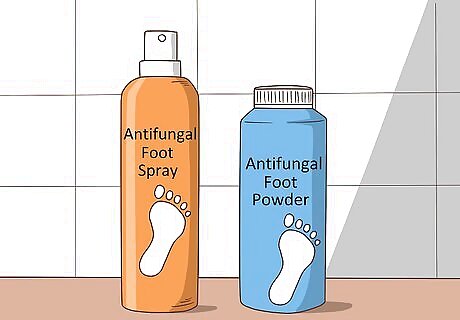
Try antifungal foot sprays or powders. There are many antifungal foot sprays, creams, and powders that are available over-the-counter. These can help protect your feet from becoming infected with athlete’s foot, or other ailments common in the wet atmosphere caused by overly sweaty feet. Try creams like clotrimazole, sprays like Tinactin (tolnaftate), or powders like Desenex (miconazole).

Consult your doctor. If you are really struggling with sweaty feet and none of the at-home remedies seem to be working, you might want to ask your doctor or dermatologist about it. Make an appointment and discuss your symptoms with your doctor. Your doctor may run some tests, consult your medical history, and come up with a plan for moving forward. Some of the more intense medical options will require a prescription, so it’s always a good idea to ask for your doctor’s advice.
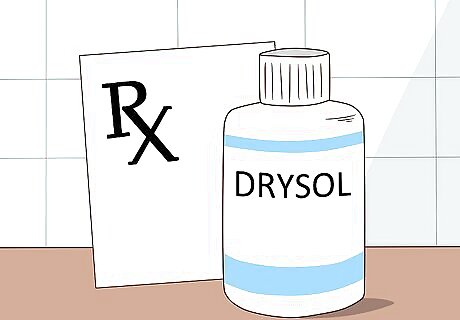
Try topical medications. Your doctor may be able to prescribe you some stronger topical medications that can help prevent your skin from sweating so much. One commonly prescribed medication is Drysol. Drysol is basically a prescription strength antiperspirant. If your doctor prescribes Drysol, make sure to follow their instructions for using this medication. You will need to apply the medicine to the affected area and then put on a protective covering, such as a pair of socks. Ask your doctor for their advice about any other topical ointments or creams that could help your condition.
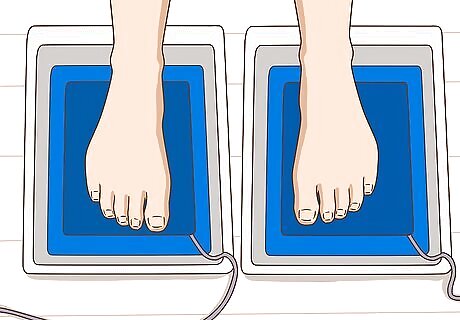
Try iontophoresis. This is a medical procedure that involves sending small electrical currents through water before it comes into contact with the skin. It is often used to treat excessive sweating, as well as certain sports injuries. Your doctor must prescribe treatment. This procedure can have quite positive results. The procedure has a 91% success rate among people with excessive sweating of their hands and feet. It is usually necessary to continue treatments indefinitely if you want to continue seeing the effects. If you stop after a few treatments, your excessive sweating will likely return.
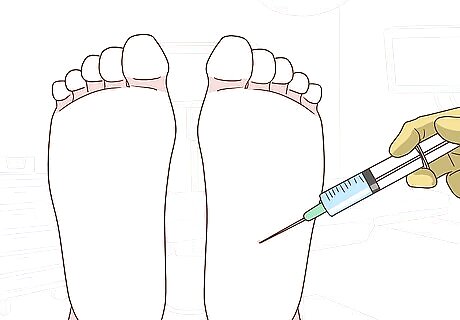
Consider Botox. Sometimes people with excessive sweating problems are directed to undergo Botox injections in the affected areas. Botox has been proven to stop signals between nerves and sweat glands, which can lead to less sweating. You’ll need your doctor’s approval to move forward with this possibility. Remember that this is a fairly extreme and expensive option with results that typically only last a few months at the most.

Ask about sympathectomy as a last result. In this surgical procedure, the surgeon either cuts or clamps the nerve chain running up the spine that regulates the body’s fight or flight response. This will prevent your body from sweating, blushing, or reacting to cold temperatures as much as it once did. Keep in mind that this procedure should be a last resort option.












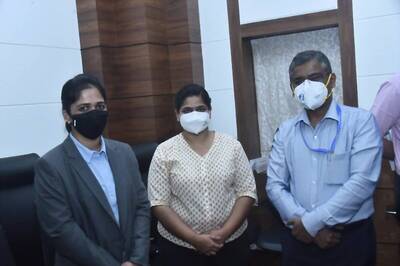

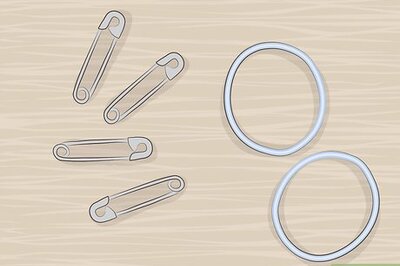




Comments
0 comment